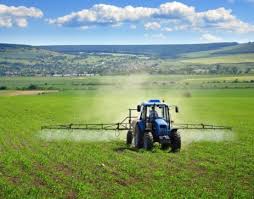
Credit: Highland osu.edu
For defense against the fungal pathogens that attack crops—think the blight that bedeviled Irish potato fields in the 19th century—farmers turn to fungicides. They’re widely sprayed on fruit, vegetable, and nut crops, and in the past decade they’ve become quite common in the corn and soybean fields. (See here and here for more.) But as the use of fungicides has ramped up in recent years, some scientists are starting to wonder: What are these chemicals doing to the ecosystems they touch, and to us?
A new paper in the peer-reviewed journal Nature Communications adds to a disturbing body of evidence that fungicides might be doing more than just killing fungi. For the study, a team of University of North Carolina Neuroscience Center researchers led by Mark Zylka subjected mouse cortical neuron cultures—which are similar in cellular and molecular terms to the the human brain—to 294 chemicals “commonly found in the environment and on food.” The idea was to see whether any of them triggered changes that mimicked patterns found in brain […]











Smaller permaculture farms are the only way to save humans and the planet Earth!